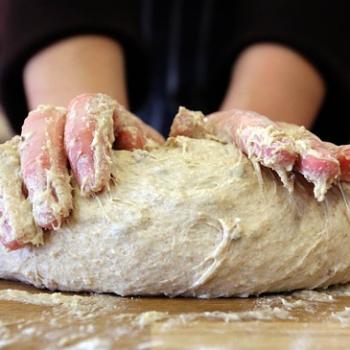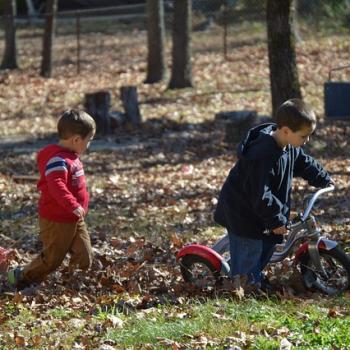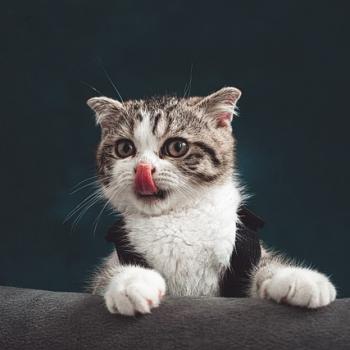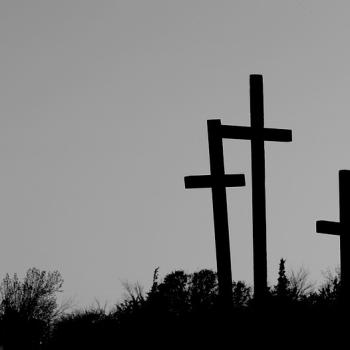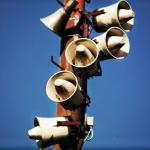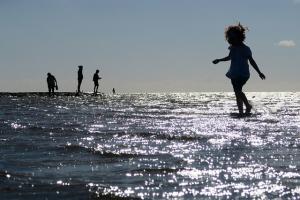
[Note: I’ve noticed that some of the links to my very old two-page blog posts from several years ago no longer work properly, so I’ll be re-posting revised and edited one-page versions of my favorite old blog posts from time to time for the next few months. A version of this post originally ran in 2017.]
We went to the beach with my bad cousins.
I grew up in Ohio. “Going to the beach” usually meant going to swat mayflies on the muddy shore of Lake Erie. An actual beach, on the ocean, was an unspeakable treat. This year, my grandmother had rented a gigantic house on stilts on the coast of South Carolina for a week at Eastertime, and invented her children and grandchildren along. We drove down from Ohio to South Carolina in the cramped little mini van; we stayed in my cousins’ house in Raleigh first, then took another long day to drive to Pawley’s Island.
We hadn’t been out of the van five minutes before we demanded to walk down the street to the beach.
The grown-ups explained that we couldn’t. We hadn’t unpacked the cars yet; they didn’t even know where our swim suits were. We were to play quietly in the beach house and stay out of trouble while our parents had a rest, and began the slow process of unpacking. There was plenty to do at the beach house. There was a yard to play in. My aunt had packed board games and crayons. We could amuse ourselves for a short time before we went swimming.
We were horrified. We’d waited months, then three days of driving, for a trip to the beach. We weren’t going to wait hours or what seemed like hours for some slowpoke grownups. They’d probably insist on having coffee, the world’s most unbearable grown-up time-wasting beverage: a bitter, scalding drink that had to be brewed for what seemed like a thousand years in a noisy percolator, then sipped daintily, barely wetting the lips, while they chatted and gossiped about us, all before they were willing to start the process that would lead to finding our swim suits. None of us could wait for that.
My father was merciful. He offered to “walk us down to look at the water,” while the other parents started coffee. After we’d admired the water, we could wait to put our suits on and go back to the beach for a dip. My father’s parents had a house in Naples, near the beach. Every year of his childhood, he’d gone to stay by the ocean. It was a perfectly normal thing for him to “walk down to look at the water.” He assumed that a pack of cooped up children, half of whom had barely ever seen the ocean, would “walk down to look at the water” with him, without any trouble at all.
We all went with him. Besides myself there was my bossy male cousin a year older than me and my rowdy male cousin a year younger, my hyperactive brother two years younger, my quiet brother two years younger still, my impish male cousin my quiet brother’s age, my quiet female cousin, my toddler female cousin and my baby sister. I was still in the long pants I’d packed in chilly Ohio; my cousins were in brand new summer outfits my aunt had bought for the trip. We all had shoes and socks on.
We “walked down to look at the water.”
We looked at it.
Next thing my father knew, we were in it.
I was in it too. I can’t tell you how I got there; I just knew that there was a beach and a whole ocean before me, and I couldn’t help myself.
“I’ll roll my pant legs up,” I called back to my astonished father.
I was looking at the water, all right– looking at it, smelling it, tasting it, lost in gleeful admiration of the miracle of the water. So were my siblings. So were my bad cousins. We were all frolicking, fully clothed, in the waves. The water was higher than our knees; it tugged on our rolled-up pant legs until they unrolled into the ocean.
“You’re all RUINING your CLOTHES!” protested my father.
I didn’t understand why he always said that– when I ran outside in the rain, when I splashed in puddles, when I jumped in the wading pool in my socks. Why did grown-ups not know that clothes were waterproof? They went into the washing machine and came out whole, didn’t they? Water didn’t ruin clothes. Water was good for clothes. If you didn’t put them in water regularly, they weren’t clean enough to wear. Yet, if I got them wet while they were on my body, my father would inevitably claim that I was ruining my clothes. Grown-ups made no sense at all.
I don’t know who had the bucket first. I just know that, at some point, we noticed a plastic bucket lying on the beach, and one of my Bad Cousins was using it to pour water onto somebody’s back. Then I had the bucket. Then someone else had the bucket. Then the original water-thrower was splashed, and another Bad Cousin cried “the joke’s on you!”
This made me think of a bad joke about “the yolk’s on you,” and the next thing I knew, the bucket was full of soaked sand, and then the sand was on the Bad Cousin’s brand new shirt and I was screaming “it’s eggs! It’s rotten eggs!”
Then came the free-for-all where we threw wet sand on one another and claimed it was poop and spoiled food. We were all thoroughly drenched from head to toe, our hair and new clothing glistening with sand.
My father started to scream.
We were marched back to the beach house in disgrace– though none of us could say what it was we did.
This is the chief difference that I have observed between grown-ups and children: grown-ups “walk down to look at the water.” Children run into water.
Grown-ups admire the aesthetics of water. Children pour buckets on one another and scream “It’s rotten eggs!” Grown-ups know the value of water, intellectually; they use it in moderation, to launder clothing and brew nasty beverages. But they balk at a good thorough soaking. Children are the opposite; they can’t resist getting soaked, and don’t see the use of coffee.
The Lord would have us be children.
The Lord came Himself as a child. He lived for years as a child. And at the beginning of His ministry as a grown man, He went down to the Jordan and waded right in. His holy forerunner John was puzzled– “I need to be baptized by you, and do you come to me?” But the Lord insisted. The Forerunner got in there with Him and poured water over His head. And the clouds opened up, and the Holy Ghost descended, and the Father was well pleased. The waters of the earth were purified by that sign, so that we might obtain cleansing and healing of sins– but only if we dare to wade into the water. There won’t be healing for the ones who stand back and admire. The healing is not on the shore. The healing is in the water.
It’s impossible to be a grown-up in the Presence of the Lord. In order to enter the Presence, you have to be a child; you have to run headlong into the water, with no thought for your new clothes or you shoes. They’ll all be stripped from you anyway, in the end. There’ll be nothing left but you, the water and the Lord, and the Lord is in the water.
Come down with me, to the water. No, don’t stop and look. That’s not what water’s for. You have to give up being a grown-up, and worrying about your clothes. Be a child. Run in. Ruin your clothes. See? Christ is in there already. The Servant of God is waiting to pour water on you, but you have to get in the water first. The Holy Ghost is going to come down from Heaven, but the Holy Ghost can’t descend on you if you’re not in the water. The Angel of the Lord will trouble the waters and heal us of all our infirmities, but we have the be in the water when he does. There’s no healing for the people on the shore.
You cannot stand back and admire the water.
You have to be a child, and get in.
Mary Pezzulo is the author of Meditations on the Way of the Cross, The Sorrows and Joys of Mary, and Stumbling into Grace: How We Meet God in Tiny Works of Mercy.








